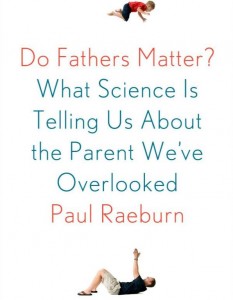Recommended
“The short answer is that fathers are vastly important in their children’s lives, in ways that few scholars or parenting experts could have foreseen,” Paul Raeburn '72 writes in the introduction of his latest book, Do Fathers Matter? What Science Is Telling Us About the Parent We’ve Overlooked (Scientific American / Farrar, Straus and Giroux).
 Raeburn, a respected science writer and father, began researching the topic five years ago. He quickly found that, until fairly recently, fathers have been largely ignored by the research community in favor of their maternal counterparts. Further, the research results that do exist on how fathers influence their children have remained mostly out of sight, published in scholarly journals not usually followed by reporters or accessible to the public.
Raeburn, a respected science writer and father, began researching the topic five years ago. He quickly found that, until fairly recently, fathers have been largely ignored by the research community in favor of their maternal counterparts. Further, the research results that do exist on how fathers influence their children have remained mostly out of sight, published in scholarly journals not usually followed by reporters or accessible to the public.
So Raeburn set about interviewing or reviewing the work of more than 100 scientists who have studied fatherhood, and summarized their results. The result, out this month in time for Father’s Day, is Do Fathers Matter?
In an e-mail interview with MIT SPECTRVM, Raeburn gave some specific examples of what the research has shown:
- Fathers play important roles in children’s development, even during pregnancy. Infants whose fathers have no involvement in the pregnancy are more likely to be born prematurely or with a low birth weight—both substantial risks to health. And fathers who are involved in their partners’ pregnancies experience hormonal changes including a decline in testosterone and a rise in prolactin—a hormone associated with nursing.
- The death rate of infants whose fathers were not around during pregnancy was nearly four times the death rate of infants whose fathers were involved with their mothers during pregnancy.
- Girls who grow up with an engaged, involved father have a reduced risk of early puberty, risky sexual behavior, and teen pregnancy. The explanation could be that fathers’ scent alters the hormonal activity in their daughters.
- Men with children work significantly more hours than men without children.
“One of the wonderful things about being a science reporter is that one gets access to a wide variety of interesting, intelligent people—the kind of people I met and spent time with while I was at MIT, as a matter of fact.”
How did Raeburn’s MIT degree in physics prepare him for a career in science writing? “Mainly, it taught me not to be intimidated by scientists, and it gave me a valuable education in how science is done. That’s been the basis of everything I’ve learned about science since.”
More: Listen to the Alum Books Podcast interview with Paul Raeburn '72.







